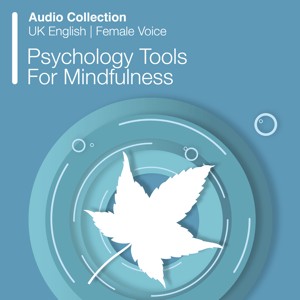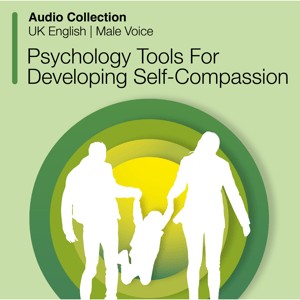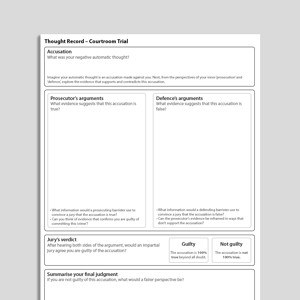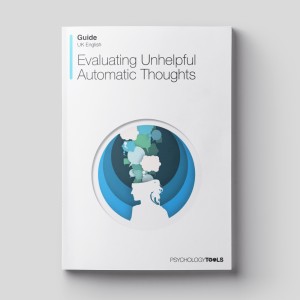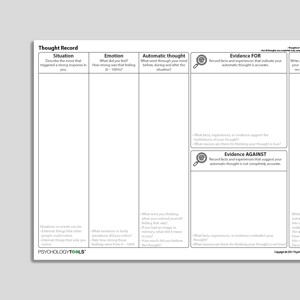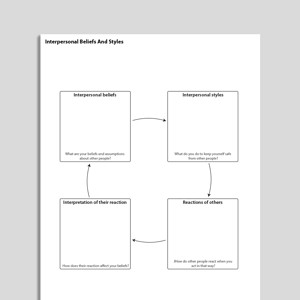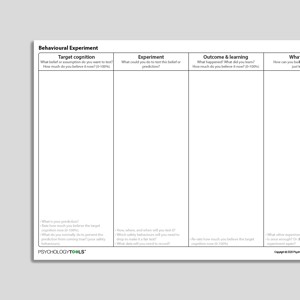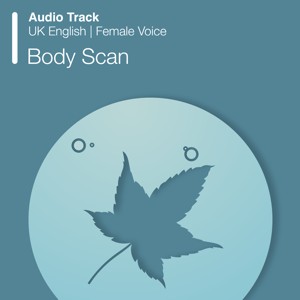Anger Management CBT Worksheets
Frustration, irritation, and anger are normal human emotions. We often feel angry when our goals are thwarted, or when we perceive that others are taking advantage of us. Anger can be a problem if it is experienced too frequently, too intensely, or if the modes through which an individual expresses their angry feelings include aggression or violence.Frameworks for understanding anger, and techniques for working with it effectively are an essential part of every clinician’s toolbox. This collection of resources has been designed to help your clients to recognize their anger, and to understand the thoughts, beliefs, and assumptions that are precipitating or perpetuating their angry responses. There are also resources for acting assertively and forgiving oneself or others.
Showing 1 to 50 of 90 results
Insufficient Self-Control
Insufficient Self-Control
Approval-/Admiration-Seeking
Approval-/Admiration-Seeking
Unified Protocol for Transdiagnostic Treatment of Emotional Disorders (Second Edition): Client Workbook
Unified Protocol for Transdiagnostic Treatment of Emotional Disorders (Second Edition): Client Workbook
Unified Protocol for Transdiagnostic Treatment of Emotional Disorders (Second Edition): Therapist Guide
Unified Protocol for Transdiagnostic Treatment of Emotional Disorders (Second Edition): Therapist Guide
Cognitive Distortions – Unhelpful Thinking Styles (Extended)
Cognitive Distortions – Unhelpful Thinking Styles (Extended)
Magnification And Minimization
Magnification And Minimization
Audio Collection: Psychology Tools For Mindfulness
Audio Collection: Psychology Tools For Mindfulness
Audio Collection: Psychology Tools For Relaxation
Audio Collection: Psychology Tools For Relaxation
Audio Collection: Psychology Tools For Developing Self-Compassion
Audio Collection: Psychology Tools For Developing Self-Compassion
Anger Self-Monitoring Record (Archived)
Anger Self-Monitoring Record (Archived)
Thought Record – Courtroom Trial
Thought Record – Courtroom Trial
Evaluating Unhelpful Automatic Thoughts
Evaluating Unhelpful Automatic Thoughts
Grounding Techniques Menu
Grounding Techniques Menu
Anger - Self-Monitoring Record
Anger - Self-Monitoring Record
What Does The Brain Do? (Lobes)
What Does The Brain Do? (Lobes)
What Does The Brain Do? (Lobes and Regions)
What Does The Brain Do? (Lobes and Regions)
Fair Fighting Rules For Resolving Conflict
Fair Fighting Rules For Resolving Conflict
Thought Record (Evidence For And Against)
Thought Record (Evidence For And Against)
Interpersonal Beliefs And Styles
Interpersonal Beliefs And Styles
Mindfulness In Everyday Life (Audio)
Mindfulness In Everyday Life (Audio)
Mindfulness Of Breath (Long Version) (Audio)
Mindfulness Of Breath (Long Version) (Audio)
Mindfulness Of Sounds And Thoughts (Audio)
Mindfulness Of Sounds And Thoughts (Audio)
Mindfulness Of Breath (Short Version) (Audio)
Mindfulness Of Breath (Short Version) (Audio)
Links to external resources
Psychology Tools makes every effort to check external links and review their content. However, we are not responsible for the quality or content of external links and cannot guarantee that these links will work all of the time.
Assessment
-
Aggression Questionnaire
| Buss, Perry | 1992
- Buss, A.H., & Perry, M. (1992). The Aggression Questionnaire. Journal of Personality and Social Psychology, 63, 452-459.
- Scale
- Measuring Violence-Related Attitudes, Behaviors, and Influences Among Youths: A Compendium of Assessment Tools, 2nd ed. | National Center for Injury Prevention and Control of the Centers for Disease Control and Prevention: Dahlberg, Toal, Swahn, Behrens | 2005
-
Clinical Anger Scale
| Snell, Gum, Shuck, Mosley, Hite | 1995
- Snell, W. E., Jr., Gum, S., Shuck, R. L., Mosley, J. A., & Hite, T. L.. (1995). The Clinical Anger Scale: Preliminary reliability and validity. Journal of Clinical Psychology, 51, 215-226
- Scale
Guides and workbooks
- Anger management workbook
- The Path to Patience: Six Practical Sections for Becoming a More Patient Person | Caroline Lavelock, Everett Worthington, Sarah Schnitker | 2013
- The Path to Forgiveness: Six Practical Sections for Becoming a More Forgiving Person | Everett Worthington | 2011
- Anger And Irritability Self-Help Booklet | Wellbeing Services South Glasgow
- A guide to controlling anger | S Black, R Donald, M Henderson | 2005
Information Handouts
- Anger coping strategies | Centre For Clinical Interventions
- Dealing with anger and impulsivity | Black Dog Institute
Presentations
- Anger, Compassion, and What It Means To Be Strong | Russell Kolts
- Anger management and coping skills | Eastridge | 2013
Self-Help Programmes
-
Anger Management Course Workbook
| NHS Newcastle And North Tyneside Community Health
- 1: About Anger
- 2. Quick Control
- 3. Strategies To Manage Your Anger
- 4. Relationships
- 5. Challenging Angry Thoughts And Beliefs
- 6. Challenges To Managing Anger
Treatment Guide
- Understanding and reducing angry feelings | Bartholomew, Simpson | 2005
- Anger management instructor guide | VA | 2008
- Working with anger – some powerful practical tips | Russ Harris
- Anger management for substance use and mental health clients: A cognitive behavioral therapy manual | SAMHSA | 2019
- Getting along & keeping cool: A group programme for aggression control | Center For Clinical Interventions | 2001
- True strength: a compassion-focused therapy approach for working with anger | Russel Kolts | 2016
Video
- Compassion, anger, strength, and moral indignation | Russel Kolts | 2020
Worksheets
- Cognitive Interpersonal Cycle Worksheet | Stirling Moorey | 2007
Recommended Reading
- Novaco, R. W. (1977). Stress inoculation: A cognitive therapy for anger and its application to a case of depression.Journal of Consulting and Clinical Psychology,45(4), 600.
- Novaco, R. W. (1976). The functions and regulation of the arousal of anger.American Journal of Psychiatry,133(10), 1124-1128.
- Mackintosh, M. A., Morland, L. A., Frueh, B. C., Greene, C. J., & Rosen, C. S. (2014). Peeking into the black box: mechanisms of action for anger management treatment.Journal of anxiety disorders,28(7), 687-695.
- Henwood, K. S., Chou, S., & Browne, K. D. (2015). A systematic review and meta-analysis on the effectiveness of CBT informed anger management.Aggression and violent behavior,25, 280-292.
- Deffenbacher, J. L. (2011). Cognitive-behavioral conceptualization and treatment of anger. Cognitive and Behavioral Practice, 18(2), 212-221.
- Day, A., Howells, K., Mohr, P., Schall, E., & Gerace, A. (2008). The development of CBT programmes for anger: The role of interventions to promote perspective-taking skills.Behavioural and Cognitive Psychotherapy,36(3), 299-312.
- How to trick ‘angry’: Narrative therapy for people with an intellectual disability | Hoole, Morgan | 2008
What Is Anger?
Signs and Symptoms of Anger
Anger is an emotional response that is associated with a spectrum of other physiological, emotional, cognitive, and behavioral reactions. Physical signs associated with anger include muscle tension, including a clenched jaw, increased heart rate, sweating, headache, or dizziness. Emotions associated with anger may include frustration, irritation, anxiety, guilt, or shame. Behaviors associated with anger can span a spectrum from expressive (e.g., raising your voice, being sarcastic or abrasive) to inhibitory (e.g., withdrawing, focusing internally).Psychological Models and Theory of Anger
In 1975 Raymond Novaco published an influential analysis of the functions and regulation of anger. He described anger as having the following functions:an energizing function which increases the vigor with which we act;
allowing for the expression of frustrations;
a self-promotional function;
a defense against feelings of vulnerability, whereby an anger response appears as secondary to a situation that has aroused anxiety.
Evidence-Based Psychological Approaches for Working with Anger
Cognitive behavioral interventions are the most studied treatments of anger (Lee & DiGiuseppe, 2018).Anger Management
Anger management is a structured treatment designed to foster the self-regulation of anger and aggressive behavior. Anger management teaches clients to become aware of signs and symptoms associated with their anger. Anger management is intended to reduce the frequency, intensity, duration, and specific modes of expression of anger. Intervention techniques include:cognitive restructuring of an individual’s ways of perceiving aversive events, unhelpful thinking styles, attentional focus, and rumination;
the use of breathing, muscle relaxation, and imagery exercises to reduce tension and arousal to provocation;
behavioral coping training including assertiveness, diplomacy, and strategic withdrawal.
Forgiveness Therapy
Forgiveness therapy is an evidence-based treatment for anger (Enright & Fitzgibbons, 2000, 2015). Enright and Fitzgibbons have published extensively regarding forgiveness therapy. Their approach views forgiveness as a process involving stages of uncovering, decision, work, and deepening.Resources for Working with Anger
Psychology Tools resources available for working therapeutically with anger may include:psychological models of anger
information handouts for anger management
exercises for anger management
CBT worksheets for anger management
self-help programs for anger management
References
Enright, R. D., & Fitzgibbons, R. P. (2000). Helping clients forgive: An empirical guide for resolving anger and restoring hope. American Psychological Association.
Enright, R. D., & Fitzgibbons, R. P. (2015). Forgiveness therapy: An empirical guide for resolving anger and restoring hope. American Psychological Association.
Lee, A. H., & DiGiuseppe, R. (2018). Anger and aggression treatments: A review of meta-analyses. Current Opinion in Psychology, 19, 65–74.
Novaco, R. W. (1975). Anger control: The development and evaluation of an experimental treatment. Lexington.
Novaco, R. W., & Renwick, S. J. (2019). Anger management. Common Language for Psychotherapy (CLP) Procedures Retrieved from: https://www.commonlanguagepsychotherapy.org/assets/accepted_procedures/anger.pdf























